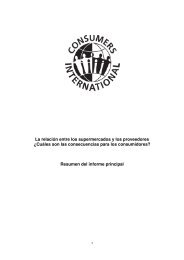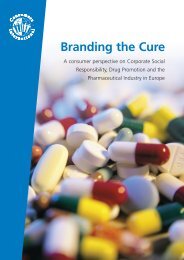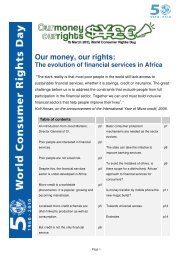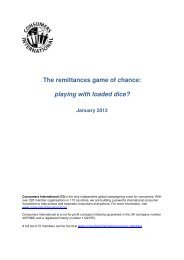Voices for Change: the Consumer Right to Representation
Voices for Change: the Consumer Right to Representation
Voices for Change: the Consumer Right to Representation
Create successful ePaper yourself
Turn your PDF publications into a flip-book with our unique Google optimized e-Paper software.
38<br />
World <strong>Consumer</strong> <strong>Right</strong>s Day 2002: <strong>Voices</strong> <strong>for</strong> <strong>Change</strong><br />
organised a meeting between an NGO and<br />
WTO members, allowing CI <strong>to</strong> share <strong>the</strong><br />
results of its <strong>Consumer</strong>s and Global Market<br />
programme. The WTO facilitated a two-hour<br />
seminar in its offices and invited WTO<br />
members and staff <strong>to</strong> attend. Some 22<br />
governments and many WTO officials were<br />
present at <strong>the</strong> meeting. “The WTO was<br />
impressed by <strong>the</strong> interest taken by its staff<br />
and members,” Durai notes, “and is now<br />
keen <strong>to</strong> repeat <strong>the</strong> exercise as a step <strong>to</strong><br />
improve external transparency.”<br />
With <strong>the</strong> November 2001 WTO Ministerial<br />
meeting in Doha behind it, CI is now shifting<br />
its focus in trade work <strong>to</strong>ward better<br />
consumer representation in trade policy –<br />
making at <strong>the</strong> national level, while<br />
maintaining pressure at <strong>the</strong> global level.<br />
Utilities: Tough<br />
Learning Curve<br />
<strong>Representation</strong> in <strong>the</strong> regulation of utilities<br />
(energy, water and telecommunications) is a<br />
deeply felt need of consumer groups in <strong>the</strong><br />
developing world. CI has strong programmes<br />
<strong>to</strong> foster representation. The most consolidated<br />
of <strong>the</strong>se is CONSUPAL (<strong>the</strong> Spanish acronym<br />
by which <strong>the</strong> project is known), launched in<br />
1996 in five South American countries and now<br />
extended <strong>to</strong> Central America. A major advocacy<br />
project has also been conducted in Central<br />
Europe. In Africa, smaller projects focusing<br />
primarily on water have opened taps and<br />
generated research.<br />
In Latin America, ef<strong>for</strong>ts <strong>to</strong> increase<br />
representation focus on consumer<br />
participation in <strong>the</strong> regula<strong>to</strong>ry processes and<br />
boards that oversee tariffs, access and quality.<br />
Until <strong>the</strong> 1990s, utilities <strong>the</strong>re were largely<br />
state-owned, as was <strong>the</strong> case in most of <strong>the</strong><br />
developing world. With <strong>the</strong> State as both<br />
provider and regula<strong>to</strong>r, <strong>the</strong>re was little room<br />
<strong>for</strong> outsiders. Many services were highly<br />
deficient but, being highly subsidised, <strong>the</strong>y<br />
tended <strong>to</strong> be cheap.<br />
The privatising trends of <strong>the</strong> past decade<br />
trans<strong>for</strong>med this panorama, as transnational<br />
corporations bought up local services, often<br />
replacing state monopolies with private ones.<br />
The application of more commercial criteria <strong>to</strong><br />
service provision brought skyrocketing tariffs,<br />
an explosion of consumer options (especially<br />
in telecommunications) and an outcry from<br />
users <strong>for</strong> a greater say.<br />
While consumer representation is a main<br />
goal of <strong>the</strong> CONSUPAL programme, this<br />
takes places primarily through national<br />
consumer groups in <strong>the</strong> <strong>for</strong>m of advocacy<br />
training, development of national action<br />
plans, technical assistance, networking and<br />
provision of funds and materials. None<strong>the</strong>less,<br />
<strong>the</strong> CONSUPAL coordina<strong>to</strong>r is a well-known<br />
figure in seminars, courses and <strong>for</strong>ums<br />
conducted at national, regional and<br />
international levels.<br />
Despite <strong>the</strong> lack of international regula<strong>to</strong>ry<br />
bodies, CI sought and obtained representation<br />
in public utilities be<strong>for</strong>e <strong>the</strong> Latin American<br />
Parliament (Parlatino), a permanent<br />
consultative body <strong>to</strong> regional governments.<br />
A cooperation agreement names CI as an<br />
“advisor” <strong>to</strong> Parlatino committees on<br />
<strong>Consumer</strong> Defence and on Public Utilities.<br />
<strong>Representation</strong> on <strong>the</strong> <strong>for</strong>mer resulted in <strong>the</strong><br />
adoption, in 1997, of Parlatino’s Model Code<br />
<strong>for</strong> <strong>Consumer</strong> Protection.<br />
<strong>Consumer</strong> representation in utilities in Latin<br />
America is still “minuscule,” says Collado.<br />
The few concessions made are more windowdressing<br />
than trans<strong>for</strong>mative, despite <strong>the</strong> fact<br />
that many mechanisms <strong>for</strong> participation are<br />
now available, including public hearings and<br />
<strong>the</strong> possibility, in some places, of appointing<br />
consumer delegates <strong>to</strong> regula<strong>to</strong>ry oversight<br />
boards, as in Argentina (water), Rio Grade de<br />
Sul, Brazil (all utilities) and, shortly, Peru<br />
(telecommunications). In Central America,<br />
consumer representation is being generated<br />
within much broader alliances <strong>for</strong> civil<br />
society participation among NGOs<br />
and unions.<br />
The biggest obstacle <strong>to</strong> greater consumer<br />
representation is <strong>the</strong> lack of political will by<br />
governments, Collado believes. Governments<br />
regulate and control and “so <strong>the</strong>y think that<br />
<strong>the</strong>y can represent consumers, <strong>to</strong>o, but this<br />
isn’t true.” Resistance <strong>to</strong> consumer<br />
representation also comes from <strong>the</strong> utility






![pkef]Qmf eg]sf] s] xf] < - Consumers International](https://img.yumpu.com/6479658/1/184x260/pkefqmf-egsf-s-xf-consumers-international.jpg?quality=85)
